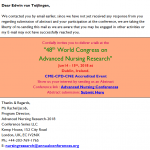Since being a lecturer I have been regularly contacted by editors and publishers who are keen to have my contribution to a journal or edited book. More recently this has become ‘open access’, which is especially significant for the future REF. On occasions these requests maybe genuine, but many are what I would call ‘predatory publishing’. This is to remind us all to err on the side of caution with some of these emails and be absolutely sure before you respond that they are bona fide publishers. It is easy to feel flattered by the attention! If it is for a journal that you have never heard of, for example, I would suggest contacting the library for information or ‘googling’ the title. Invariably you may then discover someone has already added this to a list of ‘predatory publishers’. Useful sources are Beall’s list http://scholarlyoa.com/2012/12/06/bealls-list-of-predatory-publishers-2013/ and also the Directory of Open Access journals https://doaj.org/ . However these may not be uptodate.
The publishers may be very clever and there have been stories of fake editorial boards, even fake editors, which may entice you. It is suggested that some are creating or buying fake impact factors. However the main goal is to get money off you or the organisation with either publication without the appropriate peer review or editorial control, or does not ever get published. This has been proved on occasion by authors sending in fake papers that are then published online without any editing. For example, https://www.sciencemag.org/content/342/6154/60.summary
More recently I have been targeted with invitations to speak at seemingly prestigious international conferences. It is not until you read the small print that there is evidence this comes from the same publishers mentioned above. An example is here: http://scholarlyoa.com/2014/03/05/oxford-on-alert-predatory-conference-organisers-are-coming-to-town-or-oxford-beware-omics-predators-are-coming-to-town/ Once more the planning behind this is to get researchers to pay to present their research or even to pretend a conference is taking place when it does not exist or is cancelled.
This article will also help understand some of the tactics used. http://www.ncbi.nlm.nih.gov/pmc/articles/PMC4315198/
The message I hope to leave with you is don’t be flattered by the unsolicited messages you receive; don’t respond until you have checked out the source; do be careful. There are plenty of reputable journals and publishers you can contact yourself.
 Fake conferences are not fake news: beware predatory conferences
Fake conferences are not fake news: beware predatory conferences To Catch A Predatory Publisher
To Catch A Predatory Publisher Why editorials?
Why editorials?










 Nursing Research REF Impact in Nepal
Nursing Research REF Impact in Nepal Fourth INRC Symposium: From Clinical Applications to Neuro-Inspired Computation
Fourth INRC Symposium: From Clinical Applications to Neuro-Inspired Computation ESRC Festival of Social Science 2025 – Reflecting back and looking ahead to 2026
ESRC Festival of Social Science 2025 – Reflecting back and looking ahead to 2026 3C Event: Research Culture, Community & Cookies – Tuesday 13 January 10-11am
3C Event: Research Culture, Community & Cookies – Tuesday 13 January 10-11am Dr. Chloe Casey on Sky News
Dr. Chloe Casey on Sky News ECR Funding Open Call: Research Culture & Community Grant – Application Deadline Friday 12 December
ECR Funding Open Call: Research Culture & Community Grant – Application Deadline Friday 12 December MSCA Postdoctoral Fellowships 2025 Call
MSCA Postdoctoral Fellowships 2025 Call ERC Advanced Grant 2025 Webinar
ERC Advanced Grant 2025 Webinar Horizon Europe Work Programme 2025 Published
Horizon Europe Work Programme 2025 Published Update on UKRO services
Update on UKRO services European research project exploring use of ‘virtual twins’ to better manage metabolic associated fatty liver disease
European research project exploring use of ‘virtual twins’ to better manage metabolic associated fatty liver disease